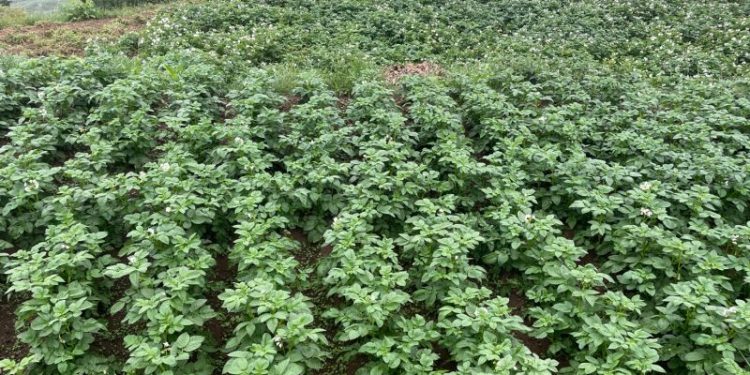#PotatoTerraceRevolution #UttarakhandFarmers #TraditionalFarming #TumrhiPotato #AgriculturalResearchCenter #SustainableAgriculture
Discover the remarkable efforts undertaken in Uttarakhand’s Tehri district to preserve and revitalize traditional farming practices. This article explores the cultivation of the local landrace “Tumrhi” potato variety, highlighting the initiatives aimed at producing high-quality seeds and ensuring their accessibility to farmers at affordable prices. Witness the positive consequences of this development and its potential to empower local agriculture.
In the picturesque Tehri district of Uttarakhand, a silent revolution is taking place in the agricultural landscape. Despite the modernization and commercialization of farming practices, farmers in this region have shown unwavering dedication to preserving their traditional landraces, notably the indigenous potato variety called “Tumrhi.”
The cultivation of Tumrhi potatoes holds great significance, not only for its cultural and historical roots but also for its exceptional taste and nutritional value. Local farmers have recognized the importance of preserving this landrace and have taken proactive steps to ensure its continuity. They have embraced sustainable farming practices, including the establishment of potato terraces, to optimize yield and conserve the local ecosystem.
One of the key challenges faced by farmers is the availability of quality seeds at affordable prices. To address this issue, various organizations and agricultural research centers have collaborated to produce the Agricultural Research Center (ARC) of Tumrhi and other local landraces. The aim is to provide farmers with access to high-quality seeds that are well-suited to the local agro-climatic conditions.
The establishment of the ARC of Tumrhi and other landraces signifies a significant milestone in empowering local farmers. It ensures that they have access to reliable sources of seeds, eliminating their dependence on external suppliers and reducing production costs. This development not only benefits the farmers economically but also safeguards the genetic diversity of local landraces, which are often at risk of being replaced by commercially viable but less resilient varieties.
The efforts to revive and promote the cultivation of traditional landraces like Tumrhi potatoes in the Tehri district have far-reaching consequences. Firstly, it helps in preserving the unique cultural and agricultural heritage of the region, ensuring that future generations can continue to enjoy the authentic flavors and nutritional benefits these landraces offer.
Furthermore, the availability of quality seeds at affordable prices empowers farmers to enhance their productivity and profitability. By reducing their reliance on external suppliers, farmers gain greater control over their farming practices and can achieve improved yields. This not only improves their livelihoods but also contributes to the overall food security of the region.
The success of the potato terrace revolution in Tehri district could potentially serve as a model for other regions facing similar challenges in preserving local landraces. The replication of this approach in different contexts can help promote sustainable agriculture, protect genetic diversity, and strengthen the resilience of farming communities worldwide.
The efforts made to revive the cultivation of the local landrace “Tumrhi” potato variety in Uttarakhand’s Tehri district exemplify the dedication and resilience of farmers in preserving their traditional farming practices. The establishment of the Agricultural Research Center (ARC) of Tumrhi and other landraces not only ensures the availability of high-quality seeds at affordable prices but also fosters agricultural sustainability and empowers local farming communities. This inspiring development paves the way for the preservation of cultural heritage, improved food security, and the promotion of sustainable agriculture worldwide.







